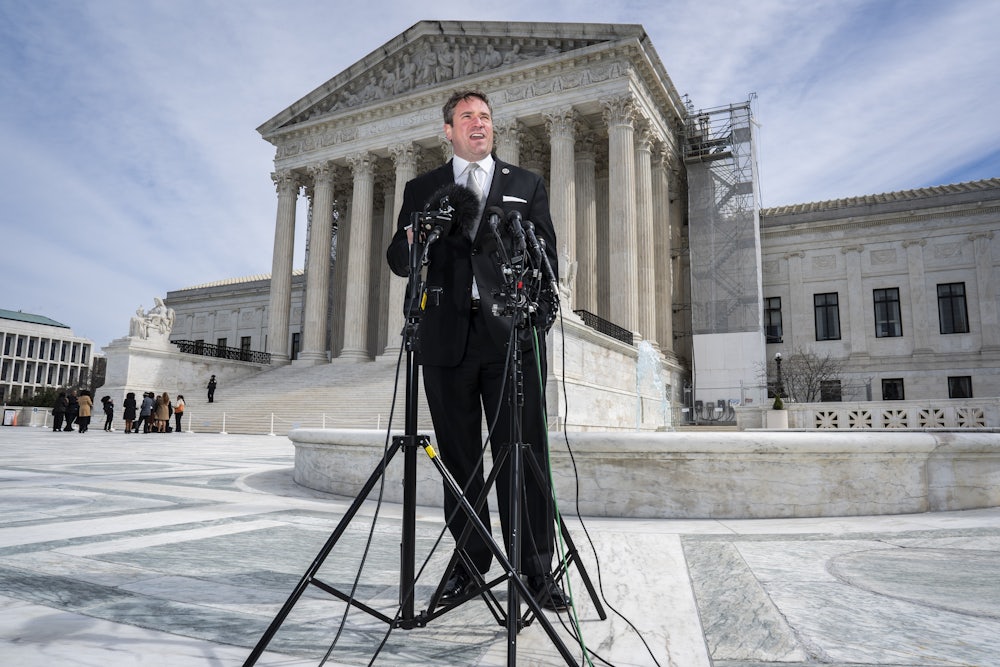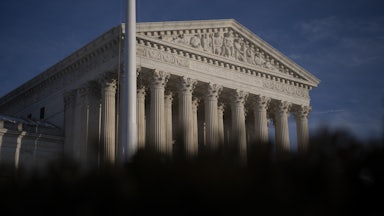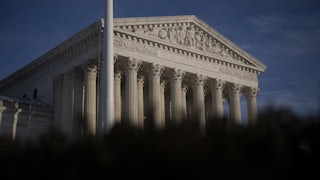The Supreme Court will reconvene from its summer recess next month for what is often described as “the long conference.” The justices typically decide what they will do with pending petitions for review at their weekly conferences when in session. For their first session back in a few months, that process takes a little longer than usual.
Of the thousands of petitions that the justices will consider, perhaps none is as extreme as Missouri v. United States. The state is trying to defend a law that uses the threat of private lawsuits to dissuade state officials, including local police officers, from allowing the enforcement of federal gun laws.
The case centers on the Second Amendment Preservation Act, or SAPA. Missouri lawmakers first passed it in 2021 in response to what its proponents described as federal overreach. Representative Jered Taylor, who introduced the bill, compared the measure to other areas of the law where states can decline to help the federal government carry out its policy goals.
“The feds use us,” Taylor told a public radio station in St. Louis in 2021. “They rely on us to enforce their laws. Look at medical marijuana in the state of Missouri. This is exactly what we do with that. It’s exactly what sanctuary cities use.” The law said that almost any federal restrictions on gun ownership or possession “shall be considered infringements on the people’s right to keep and bear arms” within Missouri’s borders.
Those restrictions include any “registration or tracking” of “firearms, firearm accessories, or ammunition,” as well any registration or tracking of their “law-abiding” owners. They also include “any tax, levy, fee, or stamp imposed” upon guns, accessories, or ammunition, aside from generally applicable sales taxes. Finally, they cover any law or regulation that orders the “confiscation” of any guns, accessories, or ammunition.
In short, SAPA holds virtually every federal gun regulation or restriction to be unconstitutional. The 2021 law declared that any such restrictions “shall be invalid to this state, shall not be recognized by this state, shall be specifically rejected by this state, and shall not be enforced by this state.”
This is not “exactly what sanctuary cities use,” as SAPA’s author had claimed. Federal immigration officials can still enforce immigration laws inside sanctuary jurisdictions; they just can’t get any help from state and local officials along the way. Instead, SAPA is a nullification law that rejects federal law altogether and punishes those who enforce it.
Nullification—the theory that states can override federal law—is hardly new. Thomas Jefferson and James Monroe first proclaimed it in 1798 to reject the Alien and Sedition Acts, to the horror of most of the other Founders. The two men argued that states could declare federal laws unconstitutional and interfere in their enforcement to “protect” their own citizens.
Past efforts to nullify federal laws have been met with failure. South Carolina said it would prevent enforcement of a controversial tariff in the early 1830s, only to back down when Congress authorized President Andrew Jackson to use the military to ensure federal law would be upheld. Southern states attempted to invoke nullification in the 1950s and 1960s to resist racial integration but were also brought to heel by federal power.
Unlike those confrontations, SAPA tries to nullify federal gun laws through indirect means. The law allows private individuals to sue “any political subdivision or law enforcement agency” that employs someone who infringed upon Second Amendment rights or employs someone who “gave material aid and support” to the federal government, including by working for it. For each violation, litigants can receive $50,000 in damages as well as lawyers’ fees.
In that sense, SAPA resembles the infamous Texas law that sought to circumvent Roe v. Wade by allowing private individuals to sue anyone who helped a woman obtain an abortion and receive damages if they prevailed. Lower courts blocked the bounty-style law at first, but the Supreme Court let it go into effect in 2021, foreshadowing Roe’s eventual demise the following year.
Missouri lawmakers may have hoped for similar success with this law. By confronting the federal government itself, however, they ran afoul of the Constitution’s supremacy clause and the various Supreme Court precedents that bar states from obstructing or interfering with federal authority. The Biden administration sued the state of Missouri in 2022 to block the law and prevailed in the lower courts.
When the state first asked the Supreme Court to intervene in 2023, the justices declined to lift the preliminary injunction. The consensus appeared to cross ideological lines. Justice Clarence Thomas was the only member of the court to publicly signal that he had voted in Missouri’s favor. Justices Samuel Alito and Neil Gorsuch, the other two most conservative members of the court, only wrote briefly to explain that they voted to uphold the injunction because, in their view, it was narrowly tailored to the case at hand.
Last summer, the Eighth Circuit Court of Appeals ruled against SAPA on the merits as well. In a brief 10-page ruling, a three-judge panel held that the law was unconstitutional because it punished federal officials for enforcing federal laws. “The ‘Second Amendment Preservation Act’ states that certain federal laws are ‘invalid to this state,’ but a State cannot invalidate federal law to itself,” the court ruled. “Missouri does not seriously contest these bedrock principles of our constitutional structure.”
That is technically true. Instead, Missouri tried a few too-clever-by-half arguments. In asking to have the Eighth Circuit’s decision reversed, the state told the justices that the court had violated the Tenth Amendment—a vague provision that reserves unenumerated powers to the states—by second-guessing its reason for passing the law.
“Before this case, it appears no federal court had ever blocked a state from exercising Tenth Amendment authority simply because of the reason the state expressed for exercising that authority,” Missouri told the justices in its petition. “The Eighth Circuit did that here, striking down a state law solely because the Act said the legislature believes certain federal statutes are unconstitutional.”
Invoking the Tenth Amendment is something of a distraction. SAPA did not merely express an opinion about the unconstitutionality of federal laws; it created a legal mechanism by which people could use that opinion to pursue lawsuits and injunctions of their own in state courts. The law is clearly intended to deter and dissuade federal officials from enforcing federal law within the state’s borders. It is, at best, nullification with extra steps.
“Missouri has the power to withhold state assistance, but the means it uses to achieve its ends must be ‘consistent with the letter and spirit of the constitution,’” the panel wrote, quoting from the landmark 1819 decision McCulloch v. Maryland on the limits of state power. “Missouri’s assertion that federal laws regulating firearms are ‘invalid to this State’ is inconsistent with both.”
The Trump administration notably chose to continue the Biden administration’s lawsuit, perhaps because of the broader implications for sanctuary jurisdictions if SAPA were upheld in its entirety. While the Justice Department suggested that it was open to limiting the injunction on procedural grounds in court filings, it strenuously argued against SAPA’s constitutionality in general.
The department took particular issue with SAPA’s penalties for former federal employees who work for Missouri law enforcement agencies. “That provision violates intergovernmental immunity by discriminating against federal employees,” the Justice Department told the high court. “It also is preempted because it obstructs the specified federal laws by discouraging federal employees from enforcing them.”
There is little reason to believe the Supreme Court will uphold the Missouri law outright if it agrees to hear the case. While the justices allowed the Texas bounty law to take effect, that statute did not claim to actually nullify federal law—except, of course, for the court’s Roe decision, which the conservative majority was going to overturn anyway. It did not implicate federal officials or their rights.
How the court reacts to the case will still be an important signal to Missouri and the handful of other states that later enacted similar “Second Amendment Protection Acts.” If the justices somehow allow the law to take effect, Democratic-led states with sanctuary jurisdictions may be tempted to enact laws that punish federal immigration officials for their Trump-era abuses through similarly roundabout torts.
Some Missouri officials may also have good reason to rethink the law’s wisdom. Among the names on the state’s petition for review is Missouri Attorney General Andrew Bailey, one of the most conservative state attorneys general in the country. President Donald Trump announced earlier this month that he would appoint him to serve as co-deputy director of the FBI.
Unless Bailey radically overhauls how the federal government enforces gun laws, he may find himself giving “material aid and comfort” to federal officials responsible for what SAPA defines as widespread violations of the Second Amendment. That could complicate his ability to go back to the Missouri state government in the future once his FBI tenure ends if SAPA is upheld—at least, not without facing a wave of lawsuits and $50,000 judgments along the way. Maybe government-by-bounty isn’t worth it after all.










